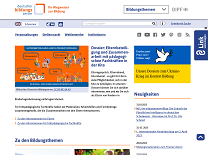wbc-inco.net : Co-ordination of Research Policies with the Western Balkan Countries – Deutsche Informationen https://www.bildungsserver.de//bisy.html?a=6884&spr=0
Das INCO-NET der Westbalkanstaaten fördert die Integration der sogenannten „Western Balkan Countries“ (WBC) in die Europäische Forschungslandschaft. Die Initiative wird im 7. Rahmenprogramm für Forschung und Technologieentwicklung der Europäischen Kommission (RP7) unterstützt. Das Projekt läuft von Januar 2008 bis Dezember 2011. Es unterstützt die „Steering Platform on Research for the Western Balkan countries” dabei , die Interaktion zwischen den Westbalkanstaaten, den EU-Mitgliedsstaaten, Staaten, die mit dem Rahmenprogramm für Forschungs- und Technologieentwicklung verbunden sind, und der Europäischen Kommission zu erleichtern. Bei dem Projekt handelt es sich um eine strategische Einrichtung, die dazu konzipiert wurde, europäische, multilaterale und regionale Fragen zum Thema Wissenschafts- und Technologiepolitik in und mit den WBCs zu behandeln.
Albanien; Bosnien-Herzegowina; Kroatien; Montenegro; Kosovo; Serbien; Nordmazedonien

